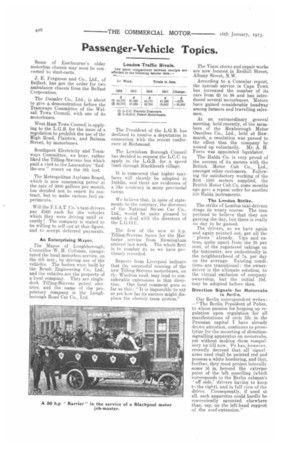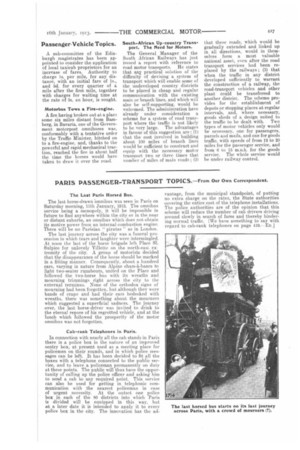Passenger-Vehicle Topics.
Page 8

Page 9

If you've noticed an error in this article please click here to report it so we can fix it.
Some of Eastbourne's older motorbus chassis may soon bc converted to dust-carts.
J. B. Ferguson and Co., Ltd., of Belfast, has got the order for two ambulance chassis from the Belfast Corporation.
The Daimler Co., Ltd., is about to give a demonstration before the Tramways Committee of the Walsall Town Council, with one of its motorbuses.
West Ham Town Council is applying to the L.G.B. for the issue of a regulation to prohibit the use of the High Road, Plaistow, and Balaam Street, by motorbuses.
Southport Electricity and Tramways Committee, we hear, rather liked the Tilling-Stevens bus which paid a visit to the Lancashire "findthe-sea " resort on the 8th inst.
The Metropolitan Asylums Board, which is now consuming petrol at the rate of 3000 gallons per month, has decided not to renew its contract, hut to make various fuel experiments.
Will the F.I.A.T. Co.'s taxi-drivers pay 2500 each for the vehicles which they were driving until re eently ? The company is stated to be willing to sell out at that. figure, and to accept deferred payments.
An Enterprising Mayor.
The Mayor of Loughborougli. Councilor W. H. Coltman, inaugurated the local motorbus service, on the 8th inst., by driving one of the vehicles. The bodies were built by the Brush Engineering Co., Ltd.. and the vehicles are the property of a local company. They are single. deck Tilling-Stevens petrol electries, and the name of the proprietary company is the Loughborough Road Car Co., Ltd. The President of the L.G.B. has declined to receive a deputation in connection with the recent conference at Richmond.
The Lewisham Borough Council has decided to request the L.C.C. to apply to the L.G.B. for a speed limit through Blackheath village.
It is rumoured that higher tax ifares will shortly be adopted in Dublin, and there are evidences of a like t endency in many provincial towns.
We believe that, in spite of statement: to the contrary, the directors of the National Steam Car Co.. Ltd., 'would be quite pleased to make a deal with the directors of the L. G. O. C.
The first of the new 40 h.p. Tilling-Stevens buses for the Harborne service from Birmingham arrived last week. The whole fleet is to number 40, as we have previously recorded.
Reports from Liverpool indicate that the successful running of the new Tilling-Stevens motorbuses, on tlify Wootton road, may lead to considerable extensions in that direction. One local comment goes so far as this: "It is impossible to say as yet how far its success might displace the electric tram system." The Vinot stores and repair works are now located in Redhill Street, Albany Street, N.W.
According to a Consular report, the taxicab service in Cape Town has increased the number of its ears from 63 to 98 and has introduced several motorbuses. Motors have gained considerable headway among farmers and travelling salesmen.
Atan extraordinary general meeting, held recently, of the members of the Mexborough Motor Omnibus Co., Ltd., held at Rawmarsh, a resolution was passed to the effect that the company be wound up voluntarily. Mr. A. H. Foers was appointed liquidator.
The Halda Co. is very proud of the success of its meters with the British Motor Cab Co., Ltd., amongst other customers. Following the satisfactory working of the first 1000 meters supplied, the British Motor Cab Co. some months ago gavc a repeat order for another 500 Halda instruments.
The Lirmdon Strike.
The strike of London taxi-drivers drags its weary course. The men pretend to believe that they are gaining the day, but there is really no day to be gained. The drivers, as we have again and again pointed out, get all the " plums" already. lips and extras, quite apart from the 25 per cent, of the registered takings on the taximeter, are undoubtadly in the neighbourhood of 75. per day on the average. Existing conditions are transitional : the ownerdriver is the ultimate solution, to the virtual exclusion of company ownership, but the initial 10d. may be adopted before then.
Direction Signals for Motorcahs in Berlin.
Our Berlin correspondent writes: —" The Berlin President of Police, to whose passion for heaping up regulation upon regulation for all manifestations of civic life in the Prussian capital I have already drawn attention, continues to proselytize for the mounting of directionsignalling apparatus on motorcabs, yet without making them compulsory up till now. Fe has, however, recently decreed that all signalarms used shall be painted red and possess a white bordering, and that, further, they must project laterally Rome 16 in. beyond the extreme point of the left panelling (which corresponds to the Berlin cabman's 'off side,' drivers having to keep te the right), and in full view of the driver. Consequently, if used at all, such apparatus could hardly be conveniently mounted elsewhere than, say, on the left-hand support of the roof-.extension."
Passenger-Vehicle Topics.
A sub-committee of the Edinburgh magistrates has been appointed to consider the application of local taxicab proprietors for an increase of fares. Authority to charge Is. per mile, for any distance, with an initial fare of Is., and 3d. for every quarter of a mile after the first mile, together with charges for waiting time at the rate of 3s. an hour, is sought.
Motorbus Tows a Fire-engine.
A fire having broken out at a, place some six miles distant from Bamberg, in Bavaria, one of the Government motorpost omnibuses was, conformably with a tentative order by the Traffic Minister, hitched on to a fire-engine, and, thanks to the powerful and rapid mechanical traction, reached the fire in about half the time the horses would have taken to draw it over the road. South-African Up-country Transport. The Need for Motors.
The General Manager of the South African Railways has just issued a report with reference to road motor transports. He states that any practical solution of the difficulty of devising a system of transport which will enable some of the undeveloped country districts to be placed in cheap and regular communication with the existing main or branch lines, and which will also be self-supporting, would be welcomed. The administration have already under consideration a scheme for a system of road transport where the traffic is not likely to be very large. The advantages in favour of this suggestion are : (I) that the cost involved in building about 100 miles of branch lines would be sufficient to construct and equip with the necessary motor transport two or three times that number of miles of main roads ; (2) that these roads, which would be gradually extended and linked up in all directions, would in themselves form a most valuable national asset, even after the road transport services had been replaced by the railways ; (3) that when the traffic in any district developed sufficiently to warrant the construction of a railway, the road-transport vehicles and other plant could be transferred to another district. The scheme provides for the establishment of depots or stopping places at regular intervals, and, where necessary, goods sheds of a design suited to the traffic to be dealt with. Two types of motor vehicles only would be necessary, one for passengers, parcels and mails, and one for goods traffic, with speeds of from 12 to 20 miles for the passenger service, and from 0 to 15 m.p.h. for the goods service. The whole service would be under railway control.






















